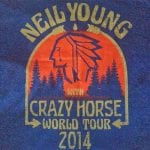Ian Tyson and Jim Cuddy at the If You Could Read My Mind Series
A note to CBC’s Laurie Brown: if you are given the opportunity to host a discussion about songwriting with two Canadian music icons, could you come up with better questions to ask?
The second instalment of the If You Could Read My Mind singer-songwriter series put on by the Canadian Songwriters Hall of Fame featured “Four Strong Winds” author Ian Tyson and Blue Rodeo frontman Jim Cuddy on October 21. Intended to attract an intergenerational audience and stir up the dreary and repetitive discourse that follows the few songwriters that have achieved status in the Canadian pop music canon, the series has also featured Gordon Lightfoot and Gord Downie. It also purports to showcase emerging talent, with Catherine MacLellan singing at the first show and Cuff the Duke singer Wayne Petti complementing Cuddy and Tyson on Thursday.
If it weren’t for Tyson’s good mood, Cuddy’s jokes, and some fine performing from both singers, the show would have fallen flat. Brown tried to aim for complete control of the evening’s progression, resorting to asking both the exact same question (and refusing to move on until they had answered), limiting interaction between the two of them, and generally broaching unnecessary, useless topics that have been hashed out again and again. At one point, Brown asked the two what genre of music they play. 1) If you live in Canada and don’t know that, then you probably aren’t attending the show and don’t need an answer from the artist’s mouth; and 2) as Tyson basically responded, who cares?
However, I shouldn’t spend this review berating Brown for what was probably an intimidating situation. Tyson can be clearly linked to the founding of the contemporary Canadian pop industry, his iconic folk and country songs co-written and performed with partner Sylvia Fricker (Tyson) among the earliest radio hits in the country. Even though Tyson spent the better part of his early career touring through and living in the US, his and Sylvia’s songs frequently referenced the Canadian experience, if not actual covers of traditional Canadian folksongs. He later came to embody the western Canadian spirit in both his lifestyle as a rancher in the Pincher Creek region of Alberta, and in his artistic output of cowboy songs detailing the landscape and its history.
Meanwhile, Cuddy, now part of Blue Rodeo for nearly 30 years, is no slouch. Aside from the band’s 14 albums and constant touring to small towns across the country, he has released two solo albums and continues to be an inquisitive participant in the contemporary Canadian scene. His affability and charisma wins over audiences even at some of his strangest gigs (for example, his solo show at the Don Mills shops in Toronto in early September—basically a free mall performance).
There was limited time for the two to perform, as they were largely relegated to the somewhat tedious conversation with Brown on a tiny square of red carpet. Both managed to alleviate silly questions like, “Ian, would you rather write a song about a horse or a woman?” with joking answers (“How about a mare”) or by talking directly to each other as though there was no host. Cuddy, obviously delighted by his opportunity to talk directly with Tyson about his songwriting process and early career, asked him questions about the meaning of recent songs and Tyson’s experiences playing at Massey Hall and working with Pete Seeger.
To Brown’s credit, she addressed what might be perceived by many as a touchy subject, and asked both performers to discuss the potentially career-destroying event of losing one’s voice. To the shock of much of the audience (myself included, who claims to be a ‘Blue Rodeo expert’ and someone who writes extensively on vocal performance in country music), Cuddy’s voice started to deteriorate and he eventually had a polyp removed from his vocal cords a few years ago. Although he has fully recovered (and sounds no different than before), this event had a sobering effect on Cuddy’s perception of himself as a perfomer, causing him to shift his focus to songwriting.
Tyson wasn’t so lucky. As noted in the promotion for his recent release, Yellowhead to Yellowstone and Other Love Stories, Tyson suffered a sudden vocal decline fighting the sound system at the Havelock Jamboree in Ontario, and his recovery coincided with a bad virus. His voice has never been the same since, with the rich bottom end now gravelly (although this is quite suitable for the difficult subjects of loss the album addresses). But on Thursday night, now at age 75, Tyson’s performance is still strong, with rollicking guitar licks and poetic lyrics about picturesque locales dominating his songs.
Both singers performed four songs from their extensive catalogue of hits, with superb backing from their side players, and came together for the finale of “Four Strong Winds,” on which Cuddy dealt out some knockout falsetto. Unfortunately, I ended up with seats that put me at an auditory disadvantage, with the sound bouncing off the back walls before it got to me. But being right above the stage, I got to not only see the two performing up close, but was able to hear the songs through their monitors, which was pretty fantastic.
For the last ten years or so, I’ve been buying tickets to Ian Tyson shows thinking that “this will be the last time I can see him,” but it seems like he’s never going to slow down.




